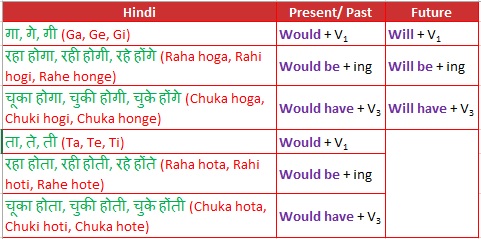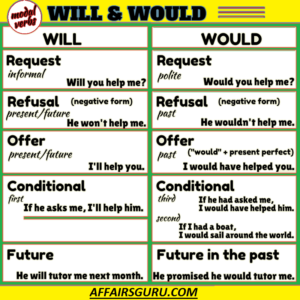These two verbs cause a lot of confusion for English Learners. In this article, we are going to clear up that confusion for you. There are main three differences between ‘will’ and ‘would’. Let’s start with most basic use of the two verbs.
Will vs Would
Differences between will and would modals in English Grammar are given below.

- I will play with you tomorrow in the morning. (Future)
- I would play with you right now. (Present)
- Would you dance with me? (Present)
- Dhoni would be playing. (Present)
- Kohli would have played. (Past)
- Aman will be going to America next month. (Future)
- That bus will have left by 6 o’clock. (Future)
- He had said that he would go. (Past)
- Mom would have left by now. (Past)
- Children would be going to school.
- I would go to school.
- Rahul would be playing with you today.
- Bus would have left.
- They would have come.
- We would have gone to America.
1. (a) will – future
We use the verb ‘will’ to talk about the future. One very common use is to make a prediction or say what we expect to happen in the future.
E.g. We will be in Hong Kong by 8 pm tomorrow. (prediction)
I’m not hungry, so i will just have an orange juice. (decision)
I will send you all the details by email. (promise)
(b) would – past tense of will
We often use ‘would’ when we report a past conversation i.e. we say what someone said in past.
We thought we would be in Hong Kong by 8 pm.
I wasn’t hungry, so i said that i would just have an orange juice.
She said she would send me all the details by email.
2. Conditionals
This is the area of most confusion for people and it is conditionals. That means sentences where you have a condition and a result.
Real situations (1st conditional) – will
If it rains tomorrow, I will bring my umbrella.
If Jared stops playing videos games, his grades will improve.
Explanation : What do you understand by that? well, it means that Jared probably spends a lot of time playing video games, so his grades are not very good. But if he stops playing video games, then he can spend more time studying and we expect that his grades will improve. In both of these sentences, we’ve used ‘will’. And that is because both of these are real situations (these are both possible). This type of sentence is called the first conditional.
But sometimes, we want to talk about imaginary or unreal situations.
Imaginary situations – would
If I had wings, I would fly all over the world.
Explanation : I can’t grow wings, so all I’m doing is I’m using my imagination. Notice that we have used the past tense throughout this sentence – ‘If I had wings’ – ‘ I would fly’
If Jared stopped playing video games, his grades would improve.
Note : Remember, with ‘will’ it’s possible, with ‘would’ it’s not possible, it’s imaginary.
Now let’s go back to Jared and his video game addiction.
Explanation : It’s similar to the sentence with ‘will’ but using the past tense (with ‘would’) just shows that I don’t think this is possible. Jared is not going to stop, he’s just going to keep playing video games and his grades and his grades are never going to improve. This type of sentence is called the second conditional.
But there’s one more – the third conditional. This is used totalk about past conditions. Imagin that Jared had his exam, and we expected, his grades were poor.
If Jared had stopped playing video games, his grade would have improved.
So here, we are talkingabout a condition in the past. Notice that we say ‘had stopped’ (this is the past perfect tense) in the condition, and we use ‘would have’ in the result.
If Nancy had gone to law school, she would have become a lawyer.
So you can see from these sentences that we only use ‘will’ when we talk about real possible situation. For Imaginary conditions, we use ‘would’.
3. Polite expressions – would
Notice that after ‘would you mind’ we have an ‘ing’ form – ‘lending’. This is the correct form when you want to make requests with this expression. You can also use it to ask for permission.
Would you mind lending me some money? (request)
Would you mind if I left a little early tomorrow? (permission)
Would you mind if i left a little early tomorrow? (permission)
Would it be OK if I left a little early in your coffee? (offer)
Would you like to come along with us? (offer)
Would you like me to give you a ride home? (offer)

Fill in the gaps with will or would
- I _______ like a green tea, please.
- Sorry I didn’t hear you. ______ you mind repeating that?
- If he doesn’t hurry, he _____ miss the train.
- _____ it be OK if I turned off the AC?
- You should read this book. You ____ love it.
- I _____ pick you up at the airport tomorrow.
- We _____ move to a bigger apartment if we could find one.
- Which team do you think _____ win the match?
1). would 2). Would 3). will 4). Would 5). will 6). will 7). would 8). will
All the best for your upcoming exam!
You can join or visit at Facebook Page or Twitter for always keep in touch with further updates.
Read more articles….
